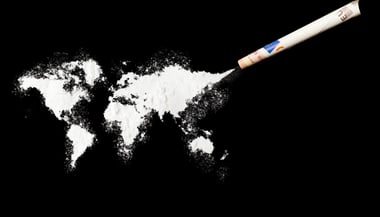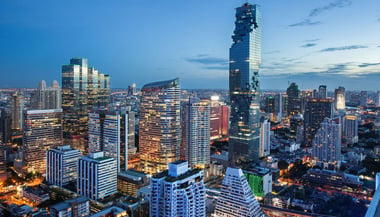Drug trafficking remains one of the most pressing threats to the Philippines, impacting national security, public health, governance, and the economy. With its strategic location and vast maritime borders, the country has become both a transit hub and a consumer market for illegal drugs. Methamphetamine, known locally as “shabu,” dominates the market, alongside marijuana and emerging synthetic drugs.
This blog explores the current state of drug trafficking in the Philippines, its links to money laundering, the root causes, government policies, legal repercussions, societal impacts, and how technology and financial intelligence can help dismantle drug networks.
The Drug Trafficking Landscape in the Philippines
The Philippines’ fight against drug trafficking is a long-standing battle. The country’s archipelagic structure—comprising over 7,000 islands—creates significant enforcement challenges, allowing drug syndicates to exploit remote coastal areas, weak border controls, and hidden shipping routes.
Key Drug Trafficking Trends in the Philippines
- Methamphetamine Dominance: The most widely trafficked and abused drug is methamphetamine, or "shabu," followed by marijuana.
- Rise of Synthetic Drugs: Emerging psychoactive substances are increasingly smuggled into the country.
- International Drug Syndicates: Drug cartels from China, Mexico, and the Golden Triangle (Myanmar, Laos, Thailand) use the Philippines as a distribution point for Southeast Asia.
- Maritime Drug Smuggling: Due to vast coastlines, narcotics are often smuggled via the seas, evading detection.
- Digital Drug Trade: Online transactions and encrypted messaging apps have facilitated the sale of illicit drugs.
Drug Trafficking and Money Laundering: A Dangerous Nexus
The illegal drug trade generates billions in illicit profits, which must be laundered to integrate into the legitimate financial system. In the Philippines, drug trafficking and money laundering are deeply interconnected.
Common Money Laundering Techniques Used by Drug Syndicates
- Casinos & Real Estate: Drug traffickers funnel money through casinos and high-value real estate to disguise illicit funds.
- Shell Companies: Fake businesses are set up to move dirty money under the guise of legitimate trade.
- Hawala & Remittance Systems: Informal money transfer channels enable laundering without detection.
- Cryptocurrency Transactions: Digital assets provide anonymity for drug-related transactions.
- Trade-Based Laundering: Drug syndicates use fake invoices and manipulated trade documents to move large sums of money undetected.
Root Causes: Why Drug Trafficking Persists in the Philippines
Understanding why drug trafficking thrives is key to crafting effective countermeasures. Several factors contribute to the persistence of the drug trade:
1. Socioeconomic Factors
- Widespread Poverty: Economic hardships drive individuals to become drug mules or small-scale traffickers.
- Unemployment: Lack of job opportunities makes the drug trade an attractive alternative.
- Urban Slums & Poor Living Conditions: Drug networks thrive in impoverished communities where enforcement is weak.
2. Governance & Corruption
- Law Enforcement Corruption: Bribes and intimidation tactics prevent authorities from effectively cracking down on operations.
- Judicial System Weaknesses: Case backlogs and legal loopholes allow many traffickers to evade severe punishment.
3. Geographic & Logistical Challenges
- Porous Borders & Vast Coastlines: The country’s layout makes it difficult to monitor drug shipments.
- Remote Areas: Drug syndicates operate in hard-to-reach regions where law enforcement presence is minimal.
Government’s Anti-Drug Policies and Law Enforcement Efforts
The Philippine government has implemented aggressive anti-drug strategies over the years, with varying degrees of success.
1. The “War on Drugs”
- The administration launched an intense crackdown on drug-related crimes, leading to mass arrests but also widespread human rights concerns.
- Impact: While it dismantled street-level drug networks, high-level syndicates adapted, shifting operations online or offshore.
2. Strengthening Law Enforcement & Intelligence Sharing
- Inter-agency collaboration: The Philippine Drug Enforcement Agency (PDEA), National Bureau of Investigation (NBI), and Anti-Money Laundering Council (AMLC) are working together to track drug financing.
- Increased Surveillance: The use of big data, AI, and forensic tools to detect drug trade patterns is on the rise.
3. Rehabilitation & Prevention Programs
- The government has launched rehabilitation programs aimed at reducing demand, but funding and accessibility remain major challenges.
Severe Penalties: The Legal Consequences of Drug Trafficking in the Philippines
The Comprehensive Dangerous Drugs Act of 2002 (Republic Act No. 9165) outlines severe penalties for drug-related offences:
- Life imprisonment to the death penalty (before abolition) for large-scale drug trafficking.
- Fines up to ₱10 million for those convicted of producing, trafficking, or distributing illegal drugs.
- Asset Seizures: Authorities can confiscate properties, vehicles, and bank accounts linked to drug syndicates.
Despite these strict laws, drug syndicates continue to operate, adapting their strategies to evade detection.
How Drug Trafficking Impacts Filipino Society
The repercussions of drug trafficking extend beyond the illicit trade itself. The consequences are far-reaching:
1. Public Health Crisis
- Increased drug addiction rates.
- Rise in HIV/AIDS cases due to drug injection practices.
- Strain on rehabilitation facilities and public healthcare.
2. Social & Economic Instability
- Drug-related violence and gang wars destabilize communities.
- Drug-related crimes discourage foreign investment, harming economic growth.
- Children and teenagers are increasingly recruited into the drug trade.
3. Corruption in Public Institutions
- Drug money influences elections and law enforcement.
- Judges, police officers, and government officials are often bribed to protect cartels.
How Technology Can Help Combat Drug Trafficking
Advancements in AI, machine learning, and big data are revolutionising drug crime detection.
Technological Innovations in the Fight Against Drug Trafficking
- AI-Powered Transaction Monitoring: Detects suspicious financial activities linked to the drug trade.
- Forensic Science: Helps trace drug shipments and dismantle operations.
- Blockchain Analysis: Identifies illicit cryptocurrency transactions used for laundering drug money.
- Global Intelligence Sharing: Law enforcement agencies collaborate via real-time data-sharing platforms.
The Role of the AFC Ecosystem in Disrupting Drug Trafficking
Tookitaki’s AFC Ecosystem is a game-changer in the fight against drug trafficking in the Philippines.
How It Works:
✅ Custom Scenarios: Identifies high-risk financial transactions linked to drug syndicates.
✅ AI-Driven Detection: Pinpoints unusual transaction patterns in real-time.
✅ Global Intelligence Sharing: Enables banks and compliance teams to stay ahead of evolving drug money laundering tactics.
By leveraging collective intelligence and advanced compliance tools, the AFC Ecosystem helps financial institutions block the flow of illicit funds, weakening drug syndicates at their core.
Final Thoughts
Drug trafficking in the Philippines remains a multifaceted problem that requires a holistic approach. While law enforcement, legal reforms, and technology are vital, addressing the root causes—such as poverty and corruption—remains crucial for long-term success.
To effectively combat drug trafficking, collaboration between governments, financial institutions, and tech innovators is essential. The AFC Ecosystem presents a cutting-edge solution in the ongoing battle against drug-related financial crimes, disrupting illicit money flows and making it harder for traffickers to thrive.
💡 Stay informed. Stay vigilant. Join the fight against financial crime today.
Anti-Financial Crime Compliance with Tookitaki?






